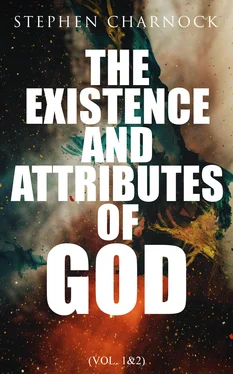Stephen Charnock - The Existence and Attributes of God (Vol. 1&2)
Здесь есть возможность читать онлайн «Stephen Charnock - The Existence and Attributes of God (Vol. 1&2)» — ознакомительный отрывок электронной книги совершенно бесплатно, а после прочтения отрывка купить полную версию. В некоторых случаях можно слушать аудио, скачать через торрент в формате fb2 и присутствует краткое содержание. Жанр: unrecognised, на английском языке. Описание произведения, (предисловие) а так же отзывы посетителей доступны на портале библиотеки ЛибКат.
- Название:The Existence and Attributes of God (Vol. 1&2)
- Автор:
- Жанр:
- Год:неизвестен
- ISBN:нет данных
- Рейтинг книги:3 / 5. Голосов: 1
-
Избранное:Добавить в избранное
- Отзывы:
-
Ваша оценка:
- 60
- 1
- 2
- 3
- 4
- 5
The Existence and Attributes of God (Vol. 1&2): краткое содержание, описание и аннотация
Предлагаем к чтению аннотацию, описание, краткое содержание или предисловие (зависит от того, что написал сам автор книги «The Existence and Attributes of God (Vol. 1&2)»). Если вы не нашли необходимую информацию о книге — напишите в комментариях, мы постараемся отыскать её.
The Existence and Attributes of God (Vol. 1&2) — читать онлайн ознакомительный отрывок
Ниже представлен текст книги, разбитый по страницам. Система сохранения места последней прочитанной страницы, позволяет с удобством читать онлайн бесплатно книгу «The Existence and Attributes of God (Vol. 1&2)», без необходимости каждый раз заново искать на чём Вы остановились. Поставьте закладку, и сможете в любой момент перейти на страницу, на которой закончили чтение.
Интервал:
Закладка:
6. If God were not a Spirit, he were not immutable and unchangeable. His immutability depends upon his simplicity. He is unchangeable in his essence, because he is a pure and unmixed spiritual Being. Whatsoever is compounded of parts may be divided into those parts, and resolved into those distinct parts which make up and constitute the nature. Whatsoever is compounded is changeable in its own nature, though it should never be changed. Adam, who was constituted of body and soul, had he stood in innocence, had not died; there had been no separation made between his soul and body whereof he was constituted, and his body had not resolved into those principles of dust from whence it was extracted. Yet in his own nature he was dissoluble into those distinct parts whereof he was compounded; and so the glorified saints in heaven, after the resurrection, and the happy meeting of their souls and bodies in a new marriage knot, shall never be dissolved; yet in their own nature they are mutable and dissoluble, and cannot be otherwise, because they are made up of such distinct parts that may be separated in their own nature, unless sustained by the grace of God: they are immutable by will, the will of God, not by nature. God is immutable by nature as well as will: as he hath a necessary existence, so he hath a necessary unchangeableness (Mal. iii. 6), “I, the Lord, change not.” He is as unchangeable in his essence as in his veracity and faithfulness: they are perfections belonging to his nature. But if he were not a pure Spirit, he could not be immutable by nature.
7. If God were not a pure Spirit, he could not be omnipresent. He is in heaven above, and the earth below; 359he fills heaven and earth. 360The divine essence is at once in heaven and earth; but it is impossible a body can be in two places at one and the same time. Since God is everywhere, he must be spiritual. Had he a body, he could not penetrate all things; he would be circumscribed in place. He could not be everywhere but in parts, not in the whole; one member in one place, and another in another; for to be confined to a particular place, is the property of a body: but, since he is diffused through the whole world, higher than heaven, deeper than hell, longer than the earth, broader than the sea, 361he hath not any corporeal matter. If he had a body wherewith to fill heaven and earth, there could be no body besides his own: it is the nature of bodies to bound one another, and hinder the extending of one another. Two bodies cannot be in the same place in the same point of earth: one excludes the other; and it will follow hence that we are nothing, no substances, mere illusions; there could be no place for anybody else. 362If his body were as big as the world, as it must be if with that he filled heaven and earth, there would not be room for him to move a hand or a foot, or extend a finger; for there would be no place remaining for the motion.
8. If God were not a Spirit, he could not be the most perfect being. The more perfect anything is in the rank of creatures, the more spiritual and simple it is, as gold is the more pure and perfect that hath least mixture of other metals. If God were not a Spirit, there would be creatures of a more excellent nature than God, as angels and souls, which the Scripture call spirits, in opposition to bodies. There is more of perfection in the first notion of a spirit than in the notion of a body. God cannot be less perfect than his creatures, and contribute an excellency of being to them which he wants himself. If angels and souls possess such an excellency, and God want that excellency, he would be less than his creatures, and the excellency of the effect would exceed the excellency of the cause. But every creature, even the highest creature, is infinitely short of the perfection of God; for whatsoever excellency they have is finite and limited; it is but a spark from the sun—a drop from the ocean; but God is unboundedly perfect, in the highest manner, without any limitation; and therefore above spirits, angels, the highest creatures that were made by him: an infinite sublimity, a pure act, to which nothing can be added, from which nothing can be taken. “In him there is light and no darkness,” 363spirituality without any matter, perfection without any shadow or taint of imperfection. Light pierceth into all things, preserves its own purity, and admits of no mixture of anything else with it.
Question. It may be said, If God be a Spirit, and it is impossible he can be otherwise than a Spirit, how comes God so often to have such members as we have in our bodies ascribed to him, not only a soul, but particular bodily parts, as heart, arms, hands, eyes, ears, face, and back parts? And how is it that he is never called a Spirit in plain words, but in this text by our Saviour?
Answer. It is true, many parts of the body, and natural affections of the human nature, are reported of God in Scripture. Head, 364eyes, and eye‑lids, 365apple of the eye, mouth, &c.; our affections also, grief, joy, anger, &c. But it is to be considered,
1. That this is in condescension to our weakness. God being desirous to make himself known to man, whom he created for his glory, humbles, as it were, his own nature to such representations as may suit and assist the capacity of the creature; since by the condition of our nature nothing erects a notion of itself in our understanding, but as it is conducted in by our sense. 366God hath served himself of those things which are most exposed to our sense, most obvious to our understandings, to give us some acquaintance with his own nature, and those things which otherwise we were not capable of having any notion of. As our souls are linked with our bodies, so our knowledge is linked with our sense; that we can scarce imagine anything, at first, but under a corporeal form and figure, till we come, by great attention to the object, to make, by the help of reason, a separation of the spiritual substance from the corporeal fancy, and consider it in its own nature. We are not able to conceive a spirit, without some kind of resemblance to something below it, nor understand the actions of a spirit, without considering the operations of a human body in its several members. As the glories of another life are signified to us by the pleasures of this; so the nature of God, by a gracious condescension to our capacities, is signified to us by a likeness to our own. The more familiar the things are to us which God uses to this purpose, the more proper they are to teach us what he intends by them.
2. All such representations are to signify the acts of God, as they bear some likeness to those which we perform by those members he ascribes to himself. So that those members ascribed to him rather note his visible operations to us, than his invisible nature; and signify that God doth some works like to those which men do by the assistance of those organs of their bodies. So the wisdom of God is called his eye, because he knows that with his mind which we see with our eyes. 367The efficiency of God is called his hand and arm; because as we act with our hands, so doth God with his power. The divine efficacies are signified:—by his eyes and ears, we understand his omniscience; by his face, the manifestation of his favor; by his mouth, the revelation of his will; by his nostrils, the acceptation of our prayers; by his bowels, the tenderness of his compassion; by his heart, the sincerity of his affections; by his hand, the strength of his power; by his feet, the ubiquity of his presence. And in this, he intends instruction and comfort: by his eyes, he signifies his watchfulness over us; by his ears, his readiness to hear the cries of the oppressed; 368by his arm, his power—an arm to destroy his enemies, and an arm to relieve his people. 369All those are attributed to God to signify divine actions, which he doth without bodily organs as we do with them.
Читать дальшеИнтервал:
Закладка:
Похожие книги на «The Existence and Attributes of God (Vol. 1&2)»
Представляем Вашему вниманию похожие книги на «The Existence and Attributes of God (Vol. 1&2)» списком для выбора. Мы отобрали схожую по названию и смыслу литературу в надежде предоставить читателям больше вариантов отыскать новые, интересные, ещё непрочитанные произведения.
Обсуждение, отзывы о книге «The Existence and Attributes of God (Vol. 1&2)» и просто собственные мнения читателей. Оставьте ваши комментарии, напишите, что Вы думаете о произведении, его смысле или главных героях. Укажите что конкретно понравилось, а что нет, и почему Вы так считаете.












